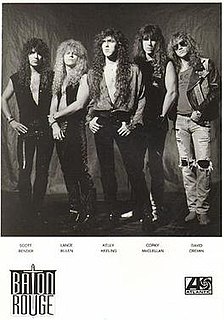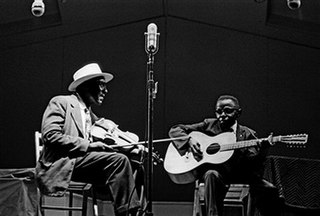Louisiana blues is a genre of blues music that developed in the period after World War II in the state of Louisiana. It is generally divided into two major subgenres, with the jazz-influenced New Orleans blues based on the musical traditions of that city and the slower tempo swamp blues incorporating influences from zydeco and Cajun music from around Baton Rouge. Major artists in the New Orleans tradition include Professor Longhair and Guitar Slim and for swamp blues Slim Harpo and Lightnin' Slim. Both genres peaked in popularity in the 1960s and were covered by a number of rock artists. Interest declined in the later 1960s but there have been occasional revivals since the 1970s.
Swamp blues is a type of Louisiana blues that developed around Baton Rouge in the 1950s and 1960s. It generally has a slow tempo and incorporates influences from other genres, particularly zydeco and Cajun. Its most successful proponents included Slim Harpo and Lightnin' Slim, who enjoyed national rhythm and blues hits and whose work was frequently covered by bands in the British Invasion.
The music of Louisiana can be divided into three general regions: rural south Louisiana, home to Creole Zydeco and Old French, New Orleans, and north Louisiana. The region in and around Greater New Orleans has a unique musical heritage tied to Dixieland jazz, blues, and Afro-Caribbean rhythms. The music of the northern portion of the state starting at Baton Rouge and reaching Shreveport has similarities to that of the rest of the US South.
James Isaac Moore, better known by his stage name Slim Harpo, was an American blues musician, a leading exponent of the swamp blues style, and "one of the most commercially successful blues artists of his day". His most successful and influential recordings included "I'm a King Bee" (1957), "Rainin' in My Heart" (1961), and "Baby Scratch My Back" (1966) which reached no. 1 on the R&B chart and no.16 on the US pop chart. A master of the blues harmonica, his stage name was derived from the popular nickname for that instrument, the "harp".
Michael "Cub" Koda was an American rock and roll singer, guitarist, songwriter, disc jockey, music critic, and record compiler. Rolling Stone magazine considered him best known for writing the song "Smokin' in the Boys Room", recorded by Brownsville Station, which reached number 3 on the 1974 Billboard chart. He co-wrote and edited the All Music Guide to the Blues, and Blues for Dummies, and selected a version of each of the classic blues songs on the CD accompanying the book. He also wrote liner notes for the Trashmen, Jimmy Reed, J. B. Hutto, the Kingsmen, and the Miller Sisters, among others.

Brownsville Station is an American rock band from Michigan that was popular in the 1970s. Original members included Cub Koda (guitarist/vocalist), Mike Lutz (guitarist/vocalist), T.J. Cronley (drummer), and Tony Driggins (bassist/vocals). Later members included Henry "H-Bomb" Weck (drummer) and Bruce Nazarian (guitarist/vocalist).

Robert Pete Williams was an American Louisiana blues musician. His music characteristically employed unconventional structures and guitar tunings, and his songs are often about the time he served in prison. His song "I've Grown So Ugly" has been covered by Captain Beefheart, on his album Safe as Milk (1967), and by The Black Keys, on Rubber Factory (2004).
Admiral Amos Easton, better known by the stage name Bumble Bee Slim, was an American Piedmont blues singer and guitarist.

Fird Eaglin, Jr., known as Snooks Eaglin, was an American guitarist and singer based in New Orleans. In his early years he was sometimes credited under other names, including Blind Snooks Eaglin, "Lil" Snook, Ford Eaglin, Blind Guitar Ferd.

Otis Verries Hicks, known as Lightnin' Slim, was an African-American Louisiana blues musician, who recorded for Excello Records and played in a style similar to its other Louisiana artists. The blues critic ED Denson ranked him as one of the five great bluesmen of the 1950s, along with Muddy Waters, Little Walter, Howlin' Wolf and Sonny Boy Williamson.
Ernest Joseph "Tabby" Thomas,, also known as Rockin' Tabby Thomas, was an American blues musician. He sang and played the piano and guitar and specialized in swamp blues, a style of blues indigenous to southern Louisiana.

Larry Garner is a Louisiana blues musician best known for his 1994 album Too Blues.
Silas Hogan was an American blues musician. His most notable recordings are "Airport Blues" and "Lonesome La La". He was the front man of the Rhythm Ramblers. Hogan was inducted into the Louisiana Blues Hall of Fame.
Robert Brown, who performed as Smoky Babe, was an American acoustic blues guitarist and singer, whose recording career was restricted to a couple of recording sessions in the early 1960s. He has been variously described as a Louisiana blues, Piedmont blues and blues revival musician. His most noteworthy recordings are "Going Downtown Boogie" and "Ain't Got No Rabbit Dog".
Boogie Bill Webb was an American Louisiana blues and rhythm-and-blues guitarist, singer and songwriter. His music combined Mississippi country blues with New Orleans R&B. His best-known recordings are "Bad Dog" and "Drinkin' and Stinkin'". Despite a lengthy career, Webb released only one album.
Clarence Edwards was an American blues musician from Louisiana, best known for his recordings of "Lonesome Bedroom Blues" and "I Want Somebody". It was not until the late 1980s that Edwards was able to establish his reputation as a blues performer, assisted by his producer and manager Stephen Coleridge.

Baton Rouge were an American hard rock band, formed in 1986 in Pearl River, Louisiana. The band produced two albums and enjoyed limited success during the final part of the hair metal explosion in the early 1990s, before disbanding. All the band members went on to work with other hard rock recording artists Lance Bulen. Vocalist and guitarist Kelly Keeling performed with Michael Schenker Group and Trans-Siberian Orchestra.

James "Butch" Cage and Willie B. Thomas were an American blues duo active from the 1940s to the early 1970s. Cage and Thomas were discovered in 1959 by musicologist Harry Oster, who promoted the two at the Newport Music Festival. Field recording with the duo conducted in the following year are praised for upholding pre-blues string band tradition.













